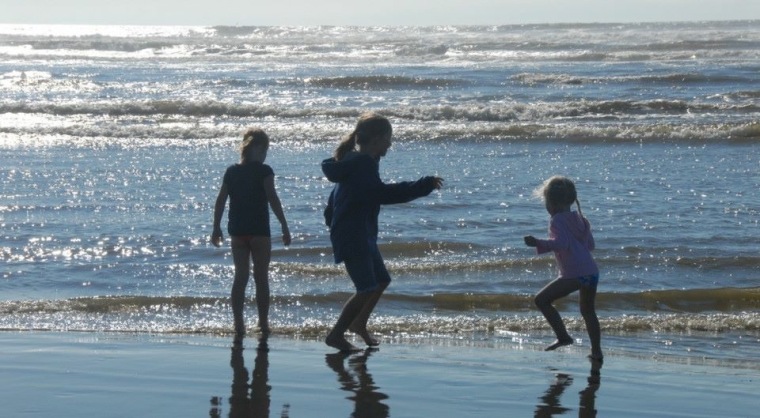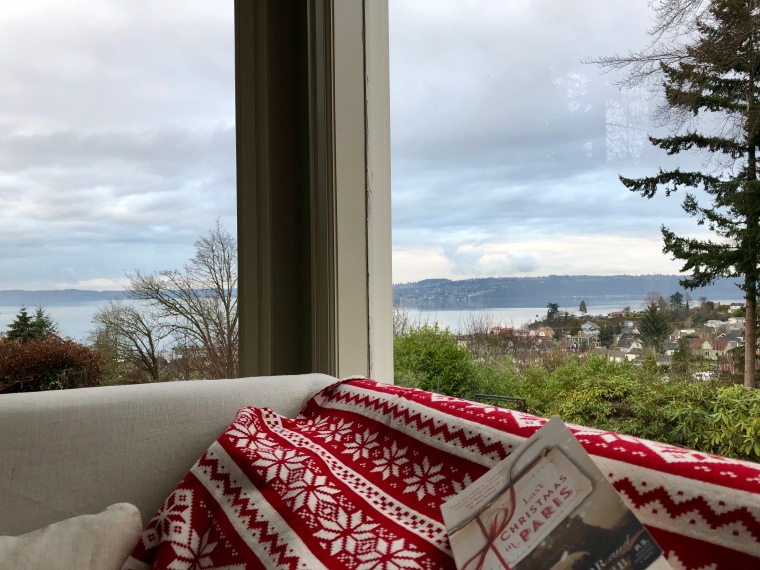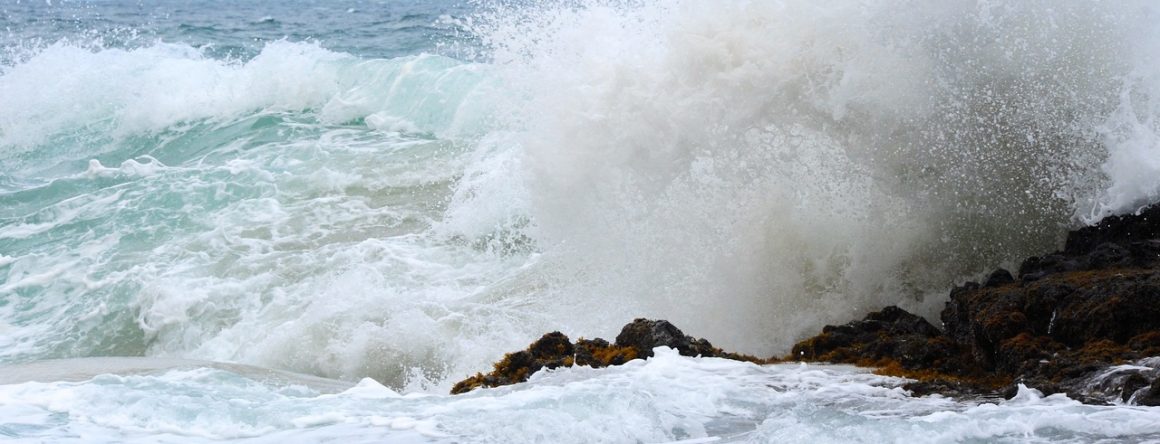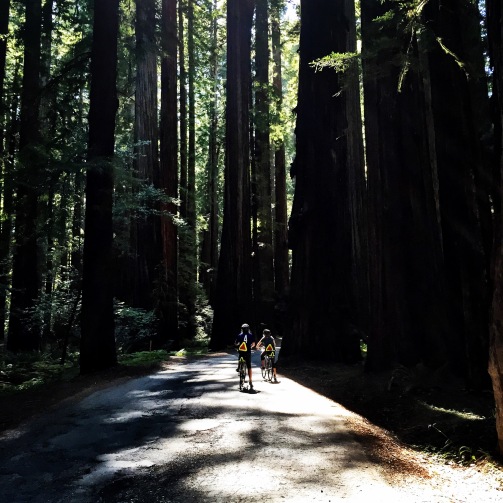
Divorce is the tragedy that sits far too close, like a high bank waterfront house at the edge of a cliff. We can see what could happen with enough weather, but turn our heads to enjoy the exquisite view instead.
“The divorce rate is still fifty percent, yet I can’t think of one couple we know who looks to be at risk,” I said to my husband a year before I found out it was us, that we were the ones about to collapse under the weight of a beautiful life and smash into the rocks below. We never think the list of terrible things that happen to other people could actually happen to us. Just in case though, it’s sensible to properly insure ourselves against the most common things like losing a job without prospects for a new one, or our health, safety, or home. It’s not easy to live with the uncertainty of real life, but we do our best to insulate ourselves and our families by doing things like going to college, exercising and eating well, we keep batteries in the smoke detectors, and teach our children to look both ways before crossing the street, to not put random things in one’s mouth.
It feels like divorce is different, that we have less control in one of the most common and devastating life-altering events, after all it takes two willing hearts to hold a marriage together. You could follow all the rules, do everything in your power and your spouse could decide they want something different. What? And, of course, we could have a change of heart too. It’s much better for our peace of mind to not look too closely. And if there are children, the heart-wrenching threat of losing your marriage is compounded by what we know or learned about what happens to kids when a family splits apart.
For me, because I experienced my parent’s divorce and subsequent remarriages, I learned what divorce was before I learned to count, and in my mind divorce meant death — that’s what my nervous system told me. It meant the end of a happy childhood and my three kids were right in the middle of theirs at the ages of six, nine, and eleven.
Although I couldn’t prevent the divorce, I could look back to understand what happened, what I could have done differently, and take responsibility for my life and my kids’ childhoods going forward. I could sift through what happened to my original family in order to understand how to get my kids back on course. Most importantly, get my kids back to being kids, allowing them to grow and flourish just as they would have if their mom and dad stayed together.
My most vital questions were, “Will divorce ruin my kids’ childhood, thus setting them up for a life less than their potential?” And, “Is there anything I can do to make sure they are protected from the statistics that follow kids who grow up in divorced families?”
Based on my own childhood growing up with my dad through three divorces and a funeral, things looked bleak. I could see the ribbons of smoke and ashes drifting and following them throughout their most formative years. In fact, my experiences growing up and the idea that my girls’ lives would be turned upside down forever caused me PTSD during and after my husband and I ended our marriage.
For me, learning more is always the first step in understanding myself and others, including why people do the things they do and act in the ways they act. Books have always been where I’ve found the answers to my most heartfelt questions and so, I set out to understand the threats to my children, assimilating the lessons I learned growing up, and what I can do to make the impact of our family transition the least traumatic for my kids as I could.
This story begins with the generational times and its effects on how we live and what we expect from a good life. My parents grew up in an idyllic part of our history where the dad went to work, mom stayed home, and the kids were either in school or playing outside in the freshly mowed grass, wandering through the trees watching butterflies land on wildflowers. Things were peaceful until the 1960s, when a simple life turned tumultuous. Divorce was just one social change that would forever alter the nuclear family. The big change came in 1969, when the Divorce Reform Act was passed, allowing couples to divorce after they had been separated for two years (or five years if only one of them wanted a divorce.) A marriage could be ended if it was irretrievably broken, without either partner having to prove fault.
When Ronald Reagan signed the first No Fault Divorce Law for the State of California in September of that year, with most states following in the next handful of years, it was meant to help struggling couples and families in traumatic circumstances. But, it proved to be the last barrier in the dam holding back the social changes of the past decade. A couple no longer needed proof of a broken marriage, such as infidelity, addiction, mental health issues, or violence, and so moving on to someone new may have seemed easier than saying “I do” in the first place.
It didn’t take long to understand you can only see the top of the proverbial iceberg from the surface of the ocean. Instincts come from the depths of our origins to fight to stay in the tribe or fight against our enemy, even if they used to be a part of you. Divorce is difficult, stressful, and traumatic and that is especially true for children. The Seventies and Eighties became known as the Age of Divorce where over a million kids a year found themselves living in two homes in the best case scenario. Maybe they moved to new neighborhood, had their own keys because mom was now working long hours. Maybe they hardly saw their dads. Many of the statistics from the Seventies and Eighties are still true today, yet we do know more based on research and, sadly, experience.
Even though the divorce rate has declined slightly since the mid-Nineties, still over a million kids a year are expelled from their lives with two parents in the same home, to a life that looks vastly different. Three quarters of kids from divorced families live with their mother and almost a third are living below the poverty line. In the New York Times Bestseller, The Unexpected Legacy of Divorce, Judith Wallerstein, Julie Lewis, and Sandra Blakeslee documented the lives of 131 children and adolescents from sixty families living in Marin County, California whose parents separated or divorced in 1971. It is a landmark study that followed children in divorcing families, both parents, as well as a comparison group of twenty-seven families in the same middle to upper-middle socioeconomic status, kids from the same neighborhoods and schools. The children selected for the study had to be developmentally on track, never having been referred for emotional or developmental problems. These kids and families were the same as you and me.
Each child, 59 mothers, and 47 fathers were extensively studied the initial six weeks, and then at eighteen months, five years, and ten years post separation. A subset were interviewed after fifteen years and then a formal follow-up of forty-eight of the original 60 families was completed after twenty-five years.
Although once silent, these children of divorce are now adults, some in relationships, single, married, divorced, and some with families of their own and can now give a voice to the effects of what many didn’t want to believe. And that is, divorce is emotionally traumatic for children and adolescents and the stress, uncertainty, and damage doesn’t necessarily end when the financial and parenting plans are signed, when most adults feel initially freed from the ugliness of the process.
Some, like many in the study, would say that is where the trauma begins and a carefree childhood ends. Like the shot of a gun, chronic, unpredictable stress starts when one parent moves out of the family home and then it continues while the family is plunged into grief for what could have been, regardless of who initiated the ending. Even if life gets back to peaceful, the stress starts again when new relationships begin, when parents get remarried, when stepsiblings are introduced, when those marriages fail (because they are more likely to,) and the single parent starts the healing process once again. Half of American children will witness their parents divorce and half of those will also witness a parent’s second marriage end. The divorce rate for first marriages is closer to forty percent, second marriages is sixty percent, and third marriages have a seventy-three percent chance of failure.
The complexities of life do not get easier in a new marriage. It becomes much more difficult, especially when children are involved and the natural alignment of life is thrown into disarray. For most kids in the study, now adults, life was forever altered when their family split apart. The ramifications coming to full fruition in their adult lives, when they have difficulties in their own relationships whether a partner they truly love never materialized, they were petrified their marriage would fail, or it did fail and they are picking up the pieces, trying their best to hold their children above the raging rivers of life not going as planned.
As a kid, divorce is a Before and After, much like when Pearl Harbor was bombed or John F. Kennedy assassinated for our grandparents’ and parents’ generations, or when the Twin Towers collapsed on that crystal blue Tuesday morning in New York City. For me, it wasn’t my parent’s “Divorce” that was so terrible, it was the severing of my connection to my mom when she moved away, and then the slow poisoning of my attachment to my dad as he put life back together three more times.
Looking back on my childhood, it was like falling out of the nest over and over, with a lack of protection that cannot be seen, only felt by a child without words beyond their basic needs. For so many of my generation, divorce represents isolation, emptiness, and overwhelming grief throughout childhood and beyond for what was forever lost: a heart connection to one or both parents. Yet, as a child you don’t have the awareness of your own emotions so you make modifications to adapt to your surroundings, your patterns of how to love and be loved get solidified as the foundations of who you are setting you up for relationship problems later in life.
Like so many whose childhood has a before and after, the seeds of heartache were planted deep in the underground of my psyche. One of those seeds is that children who go through divorce are more likely to have relationship difficulties and to get divorced, despite it being the one thing they swear they will never do. How does this happen? There isn’t a statistic I wanted less to do with than this one, and in fact, I thought I had outrun that one in my thirteen year marriage that had all the right ingredients for success. The nuances of our relationship patterns are buried deep and no one wants to get the shovel out unless that’s the only option. I certainly didn’t.
But, you can’t will the seed of sunflower to grow tall and strong with exquisite petals, just as you can’t will the roots of a dandelion to wither and die without digging into the depths of the soil and remove it from the base. We can’t fix a problem unless we know it exists. Awareness is the first step and that is the basis of this book by example of my childhood growing up in the Age of Divorce. My experiences laid the foundation for me to know what to do for my girls when our life took a turn — despite all instincts that go along with being plunged into your worst nightmare.
When parents decide to part ways, it can be a single emotional trauma within a childhood or it can be the beginning of a cascade of adverse childhood experiences that cause lifelong emotional and physical consequences.
It’s about chronic emotional stress caused by the threat of a parent not being as available as they have been in the past either physically or emotionally — and both cause a child distress in a range of severity depending on the age of the child, temperament and other factors that can be out of the control of parents. For example, when a non-custodial parent (usually the dad) remarries their visitations drop in half the first year. Their kids from the failed marriage slowly lose their connection physically and emotionally to their father. The most devastating statistic of divorce is that twenty-eight percent of children in our country are being raised without their father in their life at all — they lost a parent to divorce whether the parents were married or not.
In 1995, physicians Vincent Felitti and Robert Anda launched a large-scale epidemiological study called The Adverse Childhood Experiences Study that looked at 17,421 child and adolescent histories of middle-aged, successful adults enrolled in Kaiser-Permanente for their healthcare. In this landmark study, The Center of Disease Control and Prevention compared the emotional childhood experiences of this mostly white, almost three-quarters college educated group to their later adult health records and found that nearly two-thirds had experienced at least one adverse childhood experience (ACE) or chronic, unpredictable, and traumatic period of stress. These included growing up with a depressed or alcoholic parent; losing a parent to divorce or other causes; or enduring chronic humiliation, emotional neglect, or sexual or physical abuse. The researchers identified ten areas of childhood chronic stress and trauma that point to family dysfunction and proved to be overwhelmingly correlated with adult disease.
The study found that children who are exposed to chaos, uncertainty, chronic stress, violence, loss, emotional/physical neglect, and abuse have significant increases in the biggest disease states as adults such as cardiovascular disease, auto-immune diseases, diabetes, migraines, multiple sclerosis, cancer, stroke, and mental health conditions such as anxiety, depression, and suicide. The reason is chronic, unpredictable toxic stress rewires the brain and nervous system to be more susceptible to all stress for a lifetime and stress is deadly.
When you have children, more is required of you. When you have children and you get divorced, an extraordinary amount is required. The stress for everyone in the family is overwhelming, instincts and fears rule behavior for the adults and their kids. Our world narrows to what is needed for surviving the day, the past and future nonexistent. Kids will reach out in tears, anger, needs for attention or behavior problems, and then they will shut down all feelings to survive the heartache of losing a parent. This is what overwhelming stress and trauma looks like for a child.
It is imperative for your child’s long-term health to limit that stress as much as possible, so they can go back to being a kid, worrying about where they will sit at lunch, games to play at recess, who their best friends are from year to year, working hard to make the basketball team, and not, what’s going to happen to their family or if and when they will see their parent again.
Divorce can be a minor emotional trauma in the lives of our children or it can be the beginning of a spiral of adverse childhood experiences with lifelong ramifications. Yes, even well-meaning, educated parents and families can harm their children — by having limited involvement in their child’s lives, emotionally harming their child’s other parent, or poisoning their child against the other parent — it happens every day, even when we know better.
There is nothing more important to a kid or teen than to be inextricably connected to the adults in their lives. Losing a secure emotional connection to an adult to whom a child has attached to causes real trauma. Sometimes this cannot be helped but to the degree that it can be, as is the case for so many couples going through a divorce, it is a parent’s absolute responsibility to foster the continuous loving connection first for the child to themselves and then to the other parent, even if it’s only in the kid’s mind and heart by speaking about the other parent with compassion.
Parents are supposed to hold the safety ropes, be the child’s witness through all their trials and tribulations, allow them to develop confidence to step out into the world, reflect the essence of their child. Kids are supposed to be the explorers, learning how things work, trusting the people in their lives will be there for them, eventually becoming a person who knows what it feels like to be loved so deeply they can feel their soul and in turn, they learn how to love themselves and others. This is what it means to grow a healthy, happy child into an adult who will attract kindness, compassion, understanding, success, and love. A child who is held onto by both parents, even in stressful times, will not become a negative statistic or repeat family traumas.
Despite our intentions, divorce cuts these healthy roots unless parents are purposeful in cultivating forgiveness and compassion for each other in marriage and in divorce. Kids can become defended and self-sufficient beyond their true self. Their emotional growth can be stunted and they become hardened to hurt much like an alpine tree weathered from winds and freezing temperatures. A child cannot grow as they are supposed to grow if they are continuously going through the storms of emotional trauma.
There are many ways children can lose their heart connection or secure attachment with their parents over the course of childhood, but divorce detonates the explosives setting the avalanche in motion, even if all other conditions are optimal. Divorce makes being a parent harder, much harder because you can no longer let the natural order of things carry your children down the trail, with the dad leading and the mom following, now you have to forge a new path to get them back to solid ground. And, although not intuitive, parents have to do this together, despite their feelings about each other. Holding on to your children through divorce is a hero’s journey that requires courage, fortitude, and forgiveness of yourself and your child’s other parent, so that they can become who they were meant to become.
What I didn’t know when my marriage unraveled is that divorce doesn’t ruin kids or childhoods, it’s the loss of a child’s attachment relationship with their parents. This means that even if your marriage cannot survive, your children can continue to thrive in a new family structure and will go on to become their best selves with the added character skills of authenticity, empathy, and resilience among others. This will require more understanding, communication, kindness, support, emotional maturity, compassion than probably occurred in the best of times in the marriage.
Family is the ecosystem in which children grow. Happy, healthy parents parent happy, healthy children and it goes the other way as well. You cannot have peaceful, content children who show up to learn at school, make and keep friendships, grow in their talents and gifts if one parent thrives and the other withers, it’s not possible. And it’s also not possible for a child to thrive without both parents in their lives on a regular basis. There will be consequences for everyone, including the parents — both of them. Growing up in a happy home (or homes as is the case post-divorce) protects children from mental, physical, educational, and social problems. We are forever connected by our beautiful children. Kindness, compassion and understanding matter.
As Jacquelyn Kennedy has been quoted, “If you bungle raising your children, I don’t think whatever else you do matters very much.” We have a choice: hold on to our kids and get them safely through a stressful time for the whole family together or allow sadness, grief, anger, guilt, blame, or even entitlement to a better life with a new partner to arrest the healthy development of our kids in body, mind and spirit. This is my story of choosing my kids based on what I learned from losing my parents to divorce.
Maya Angelou said it best when she said: “Do the best you can until you know better. Then when you know better, do better.”










